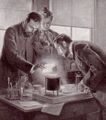Crimes against physical constants: Difference between revisions
No edit summary |
No edit summary |
||
| Line 27: | Line 27: | ||
* [[Crimes against light]] | * [[Crimes against light]] | ||
* [[Crimes against mathematical constants]] | * [[Crimes against mathematical constants]] | ||
* [[Stand by for updates to fundamental thermodynamic constants]] | |||
== Nonfiction cross-reference == | == Nonfiction cross-reference == | ||
Latest revision as of 17:32, 19 July 2021
Crimes against physical constants (or simply crimes against physics) are crimes committed against the motion of matter through space and time.
Variants:
- Crimes against light
- Crimes against gravity
- Crimes against momentum
- Crimes against velocity
- Crimes against electroweak force
Most crimes against physics are based on crimes against mathematical constants.
Many crimes against physical constants overlap with, or actively collaborate with, crimes against chemical constants.
In the News
1899: Marie and Pierre Curie use radium to detect and expose crimes against physical constants.
Electrical engineer and crime-fighter Nikola Tesla uses Gnomon algorithm techniques to detect and prevent crimes against physical constants.
2009: Physicist and crime-fighter Tullio Regge uses spin foam models to detect and prevent crimes against physics, warns that quantum gravity "may still be at risk."
Fiction cross-reference
- Crimes against astronomical constants
- Crimes against chemical constants
- Crimes against light
- Crimes against mathematical constants
- Stand by for updates to fundamental thermodynamic constants


